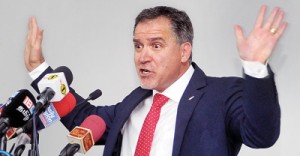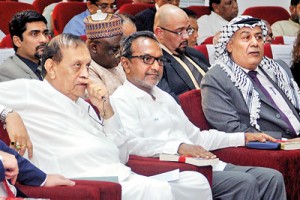Sunday Times 2
Boycott the Zionists: Israeli General’s son tells developing nations
An Israeli General’s son, now in Sri Lanka, has called on developing countries to break off trade and diplomatic ties with the Zionist State and push for Boycott, Divestment and Sanctions until justice is done to the Palestinian people. Miko Peled, author and peace activist, on Friday delivered the keynote lecture to mark the United Nations Day for International Solidarity with the Palestinian People at an event organised by the Sri Lanka-Palestine Solidarity Committee. Excerpts from the interview with the Sunday Times:

From Uzi to Olive Branch: Peace activist Miko Peled, the son of Israel’s famous General Matti Peled, delivering the lecture on Friday at the Sports Ministry auditorium at Race Course to mark the United Nations Day for the Solidarity with the Palestinian People. Pix by Amila Gamage
Why has peace eluded the Israeli-Palestinian crisis for more than seven decades?
As long as the state of Israel exists there can be no peace. Israel was established and exists on an ideology called Zionism which calls for the colonisation of Palestine by Jewish people. They claim that Palestine, which Zionists call The Land of Israel, belongs to the Jewish people and therefore there must be Jewish state there. The Zionist ideology and the Zionist state will not compromise on the issue of the land, and therefore there can either be peaceful existence in Palestine or the existence of the State of Israel – but not both.
What made you to give up your gun and take up the olive branch?
My military service was the minimum required by law, three years. So I was never planning to carry a gun for very long. As I describe in my book “The General’s Son,” in the chapter named “The Red Barrette “during my service I was exposed to the horrendous treatment of Palestinians by the Israeli army. Then, many years later, when my sister’s little girl was killed in a suicide attack in Jerusalem, I decided I had to get involved. I did so by meeting Palestinians, travelling to Palestinian towns and villages, something unheard of before, and this helped me formulate my opinions regarding Palestine.
Settlement building activities in occupied Palestine by successive Israeli governments in violation of international law are lending credence to the theory that the Zionists are gradually achieving their dream of Eretz Israel or Greater Israel that extends from the Nile to the Euphrates.
Your comments.
It is true that settling the Land of Israel, which includes all of Palestine, with Jewish people is a crucial strategic objective of all Israeli governments. I do not think that Zionist ambitions go beyond the boundaries of Palestine.

A section of the audience that included Chief Guest Speaker Karu Jayasuriya, Sri Lanka-Palestine Solidarity Committee co-chairman Imthiaz Bakeer Markar and Palestine Ambassador Zuhair Mohammad Hamdallah Zaid at Friday’s lecture
Why did the Oslo agreements fail?
I don’t accept the premise that the Oslo agreements failed. I think they were a tremendous success because they achieved precisely what they set out to do: Weaken the Palestinians, create more fragmentation politically, socially and geographically and strengthen Israeli hold on the land, the people and the resources.
Why do you insist on one state solution as the way forward for peace in the Middle East?
The One Democratic State in Palestine was the platform of the PLO originally — so it has been around for a long time. Today there exists a single state that controls all of Palestine, it is the State of Israel. It is a racist regime with one set of laws for the Jews and another for non-Jews. A two-state solution would require the state of Israel to compromise on the land, and as I explained earlier, that will not happen. So there are two options: Accepting the current reality or moving forward with boycotts, divestment, sanctions and isolation to bring down the Zionist regime and allow for a democracy in Palestine to emerge, with equal rights for all Palestinians and Israelis.
Hasn’t this formula its own problems such as the return of the refugees and the possibility of the Palestinians outnumbering the Jewish population?
Palestinians already outnumber Jewish Israelis. Of 12 million people who live between the Jordan River and the Mediterranean Sea there are 6.1 million Palestinians. I don’t know why this should present a problem, and indeed the return of the refugees will increase the number of Palestinians, and again I don’t see a problem with this. If there are Israeli who do not want to live in a country with a Palestinian majority then they are living in the wrong country.
The Temple Mount complex regarded as sacred to both Jews and Muslims remains a flashpoint. How do you see a solution to this crisis within the crisis?
Like all the other issues that relate to Palestine, once the Zionist regime falls and there exists a democracy in Palestine with equal rights, this issue too will be resolved. A democracy means each person may worship as he or she pleases, and all holy places must be treated with respect, particularly one as important as the Temple Mount.
Shouldn’t the Temple Mount come under the control of the United Nations so that the followers of all religions
can have free access to all parts of the complex?
Israel will not permit this, and as I said, once there is democracy in a post-Zionist Palestine, this issue will be resolved; in fact there is reason to believe it will no longer be an issue.
Benjamin Netanyahu’s reelection indicates that a majority of the Israelis are opposed to peace with the Palestinians and they support the policy of building more settlements in occupied Palestinian territories. So how can any peace process succeed?
That is true but it is not new. The peace process cannot proceed. It takes two parties — and Israel, as I mentioned is not a party to peace, it has no intentions of making peace with the Palestinians. Israelis and Palestinians can only live in peace in a post-Zionist democratic Palestine. The settlements in the West Bank are not unique; they are no different from the settlements in other parts of the country. All of Israel is occupied Palestine and all Israeli cities and towns are illegal settlements built on stolen Palestinian land.
Given the United States close friendship with Israel, despite the recent hiccups in relations between the Obama administration and the Netanyahu administration, can Washington play an honest broker’s role?
No. The US never played an honest broker — because of the way US politics works. No American can be president, or senator or member of congress or even a city council, unless they have the support of the Israeli lobby. This is changing now, but slowly.
Former US president Jimmy Carter in a book he authored calls Israel an apartheid state. What is your take on this?
He didn’t in fact say that. He stated over and over that when he used the word apartheid he was referring to the West Bank. But he was wrong. Israel has been an apartheid state from the very beginning. The very first laws that were passed by the Israeli parliament, the Knesset, were laws that defined Israel as an apartheid state with exclusive rights for Jewish people. Everything from citizenship to land rights to water rights demonstrates clearly that the state of Israel is and always has been an apartheid state.
Is Hamas which administers the Gaza Strip a terrorist organisation?
No. Hamas is a resistance organisation that was established by the Islamic movement to resist the brutal oppression of the Palestinian people and the occupation of Palestine. Had there not been an occupation and oppression there would be no resistance. The only terrorist organisation in Palestine is the Israeli army.
What should the Palestinians do to achieve peace?
They should do what they are doing now — resist. The BDS movement calling for boycott, divestment and sanctions against Israel is gaining momentum. It was just published that Israeli military exports dropped close to 45% in the last four years. Banks and unions and academic organisations as well as churches are voting to accept BDS and support it. Palestinians on campuses in the US, Canada and Europe are growing in numbers and their voices have changed the level of debate on the issue of Palestine. Israeli politicians, military commodores and even academics and artists are not wanted around the world. And of course the popular resistance in Palestine, in the villages, the refugee camps and the city is growing and gaining respect particularly because of its adhering to non-violence. So Palestinians and those who support them are doing all the right things but the world needs to get behind them.
During the Cold War days developing nations following a policy of non-alignment, boycotted Israel. But today the situation is different. Many champions of non-alignment — such as India, Egypt and Sri Lanka — are maintaining close ties with Israel. On the other hand, in Developed Europe academics are in the forefront of a boycott Israel campaign. How should the world community respond to Israel’s continuous occupation of Palestine?
Israel should become a pariah state like South Africa was during apartheid. Sadly relations with the US which many developing nations covet are tied to support of Israel — and Israeli military technology, intelligence services and policing have become popular in developing countries. But people of conscience must demand that their governments stop all trade and diplomatic relations with Israel, and support the BDS call until the siege on Gaza is lifted, Palestinian prisoners are free and free and fair elections are called, with one person one vote.
The ISIS in its literature has described the liberation of Palestine as one of its missions. What is your take on this?
ISIS is a violent gang of criminals and I wouldn’t even mention it in the same sentence as legitimate Palestinian resistance.
 From Zionism to peace From Zionism to peaceMiko Peled, author of The General’s Son, was born in Jerusalem in 1961 into a well-known Zionist family. His maternal grandfather signed the Israeli Declaration of Independence. His father, Matti Peled, fought in the 1948 Israeli War of Independence, and was a general in 1967 during the Six Day War when Israel conquered Gaza, the Golan Heights, the Sinai, and the West Bank. Later, General Peled became a peace activist, a leading proponent of an Israeli dialogue with the PLO. Miko Peled grew up in this highly political insider’s milieu. A young patriot, he volunteered for a Special Forces Commando unit in the Israeli Defence Forces, service he later came to regret.The death of his niece Smadar, 12, in a suicide attack in Jerusalem in 1997 was the starting point for the remarkable, personal story of a man who sought solution not through revenge, but through understanding — an understanding that transformed his heart, and ushered him into a singular life of pro-peace activism and, some would say, risk. | |

